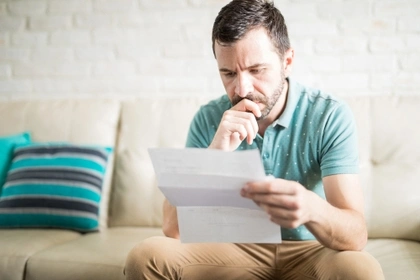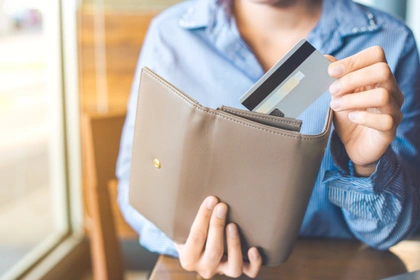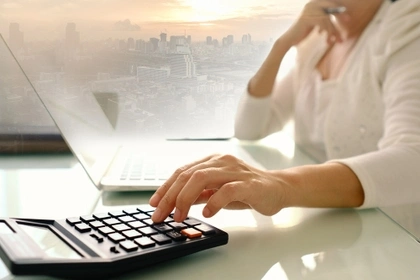How long do you have to pay off a credit card?
Payments on credit cards are usually monthly. You can easily find out when yours is due by:
- Checking your credit card statement: The due date is usually at the top.
- Logging into your account: Your lender’s app or website will display everything you need to know.
- Calling your lender’s customer service team: They can confirm the date for you.
Once you know your due date, aim to pay your bill in full before this date to avoid interest. In lending terms, interest is the amount you’re charged to borrow money. Most cards offer an interest-free period of around a month, and some even come with longer periods as a sign-up incentive.
Top Tip: Set up a Direct Debit a few days before your due date. This ensures you pay on time every month and helps you stay on track.
How much of my credit card bill should I pay?
- Ideally, aim to pay your balance in full. This avoids interest and keeps your finances healthy.
- Pay at least the minimum if you can’t pay your balance in full. This protects your credit score and avoids late fees.
- Aim to keep your balance low below 30% of your credit limit to maintain a good credit score.
Should I pay off my credit card in full or leave a small balance?
It’s best to pay your credit card off in full if you can. This way, you avoid interest charges and show lenders that you’re managing credit responsibly.
There’s a myth that leaving a small balance helps your credit score – but this isn’t true. Credit reference agencies and lenders usually prefer to see:
- Regular, on-time payments
- A low credit utilisation (ideally under 30% of your credit limit)
- Full balance payments where possible
So, if you’re able to clear the full amount each month, go for it. It won’t hurt your score – in fact, it could help it.
Ocean Credit Card
See if it's a YES before you apply
- Up to £8,000 credit limit
- Checking won't affect your credit score
- Get a response in 60 seconds
Intelligent Lending Ltd (credit broker). Capital One is the exclusive lender.

Do you pay interest on a credit card if you pay it off every month?
No, you won’t pay interest if you pay off your balance in full every month. Most credit cards offer an interest-free grace period (usually 40–60 days) on purchases, as long as you clear your balance by the due date. However, if you only make partial payments, interest will be charged on the remaining balance.
For existing balances, consider transferring your debt to a 0% balance transfer card to avoid interest and save money.
What’s the difference between the reporting date and the due date?
Credit card providers report your balance to credit reference agencies around the same time each month. This isn’t always the same as your due date. If your balance is high on the reporting date, it may affect your credit utilisation ratio.
For example:
- Your credit card limit is £1,500.
- You’ve spent £1,000 to buy a dishwasher.
- You plan to pay it off by your due date (the 25th), but your card issuer reports balances on the 19th.
Your reported credit utilisation ratio would be 66%, which could affect your credit score temporarily even though you planned to pay it off.
Can I change my payment due date?
Yes! Many lenders allow you to choose a due date that works best for you. Contact your card provider or use their online service to update it. Keep in mind that some providers limit how often you can make changes.
Can I pay my credit card in cash?
Yes, paying in cash is an option, but it depends on your card provider. Some lenders accept cash payments through specific methods, while others may not. Here’s how you can pay with cash and what to keep in mind:
- Visit your bank: You can pay your credit card bill with cash at your bank’s branch. Make sure you have your credit card details or a payment slip handy.
- Use a PayPoint or Post Office: Many lenders allow cash payments via a PayPoint or the Post Office. You’ll need your statement, or a payment slip to process the payment.
- Confirm with your lender: Not all card providers support cash payments. Some may require payments through a bank transfer, Direct Debit, or online. It’s always best to check with your lender in advance to confirm the options available.
Keep in mind that cash payments can take longer to process, depending on the payment method and your lender. For example, payments made at a Post Office or PayPoint may take a few working days to clear, so it’s important to allow extra time to avoid missing your due date.
Can I pay my credit card bill at the Post Office?
Yes, many UK credit card providers let you pay your bill at the Post Office – but not all. Here's what to know:
- Check with your lender first – Not every credit card company accepts Post Office payments. Your provider’s website or customer service team can confirm.
- Bring the right paperwork – You’ll usually need your credit card statement or a payment slip with a barcode so the Post Office can process the payment.
- Allow extra time – Payments made this way can take a few working days to clear, so don’t leave it to the last minute.
If paying in person suits you better, the Post Office can be a handy option – just make sure you leave enough time for the payment to go through.
What happens if I pay my credit card early?
Paying your credit card early can be a good thing. In fact, it may help you save money and improve your credit score. Here’s what can happen:
- You could pay less interest – If you carry a balance, paying early reduces the amount of interest that builds up before your statement date.
- It may boost your credit score – Credit scoring models (like those from Experian and Equifax) look at your credit utilisation – that’s how much of your credit limit you’re using. Paying early lowers your balance, which can improve your score.
- You might free up more of your credit limit – If you pay before a big purchase, you’ll have more available credit to use.
- It won’t hurt your credit – Some people worry early payments might affect their score negatively, but that’s not the case. You’ll still be seen as managing your credit well.
Tip: If you always pay your full balance early (before the statement is issued), you can even avoid interest entirely – as long as you don’t carry a balance from the previous month.
I have an interest-free period, when should I pay my bill?
Even with an interest-free period, it’s a good idea to pay at least the minimum regularly. This helps you stay on top of your balance and avoid a big bill when the interest-free period ends.
What happens if I miss a payment?
Life happens, and sometimes payments are missed. If this happens, here’s what to expect:
- Interest charges: You may end up paying more on your balance.
- Late fees: Your provider could apply a penalty charge.
- Credit score impact: A missed payment can stay on your credit report for six years, which might affect your ability to borrow in the future.
While it’s best to avoid missing payments, don’t worry—there are steps you can take to get back on track. If you’ve missed a payment, try to pay it as soon as possible. Reaching out to your credit card provider to explain the situation can also help—they may be able to offer support or waive fees in some cases.
Disclaimer: We make every effort to ensure content is correct when published. Information on this website doesn't constitute financial advice, and we aren't responsible for the content of any external sites.






